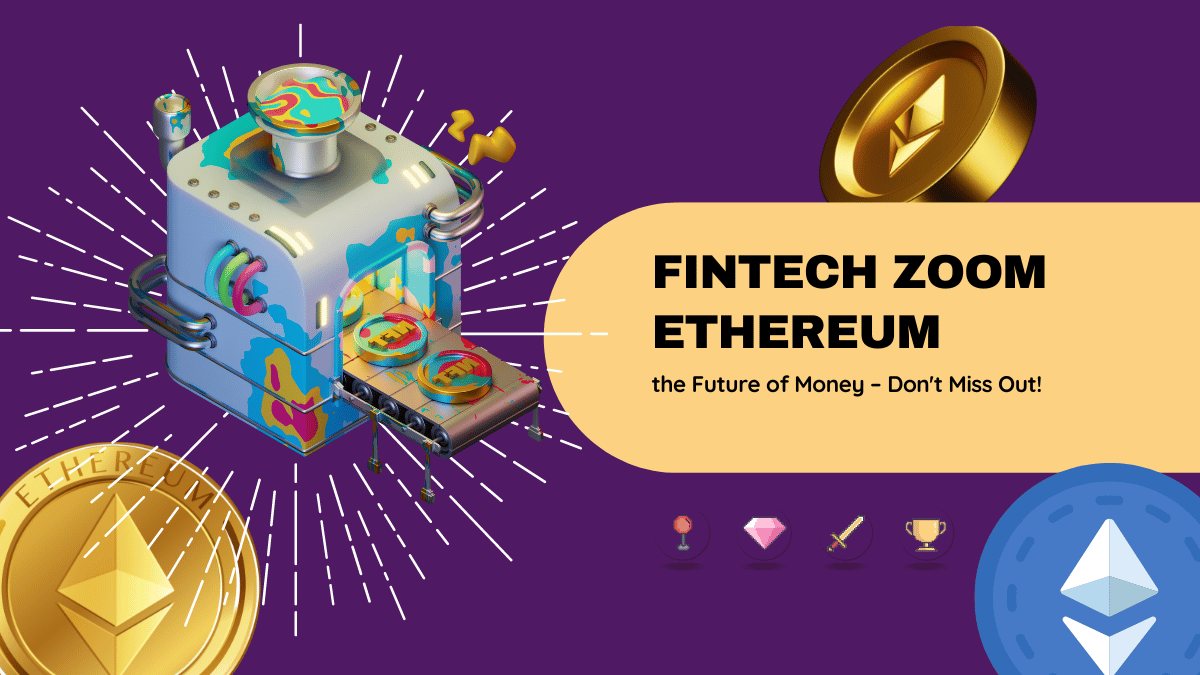
Why Fintech Zoom Ethereum is the Future of Money – Don’t Miss Out!
Ethereum is the second largest cryptocurrency in terms of market capitalization, has been a major force in the market since its debut in the year 2015. Even though Bitcoin is frequently described as “digital gold,” Ethereum is well-known for its innovative technology and adaptability that have allowed it to be the foundation of the decentralized financial system (DeFi). This article we’ll explore the depths of “Fintech Zoom Ethereum” to examine the ways in which this cryptocurrency is transforming the fintech sector.
Table of Contents
ToggleWhat is Ethereum, and Why is It So Important?
At its heart, Ethereum is a blockchain platform that allows developers to create decentralized applications (dApps) with smart contracts. Contrary to Bitcoin that is predominantly used as a digital cryptocurrency, Ethereum provides a platform that can be used for many different applications, which range in scope from supply chain services and financials. This flexibility has put Ethereum as a leader in the movement towards decentralized finance which makes it a significant player in the fintech market.
What is the Ethereum Technique?

“Ethereum Technique “Ethereum technique” refers to the usage of smart contracts as well as its decentralized approach to developing applications. Smart contracts execute themselves that have the contract’s terms directly written into the code. This means that there is no necessity for intermediaries and makes the process secure and transparent. Ethereum’s usage of blockchain technology provides an unchangeable and secure ledger, which is essential in applications that require the highest amounts security and transparency. security and openness.
What is the Point of Ethereum?
The purpose of Ethereum will be to impart an open, decentralized platform that can be used to build a broad array of applications, beyond just cryptocurrency transactions. While Bitcoin is mostly used to facilitate peer-to-peer financial transactions, Ethereum aims to offer additional services, ranging including financial services such as credit and borrowing, as well as digital identification management as well as transparency of supply chains. With the ability to let developers create and launch dApps Ethereum is aiming to make it easier for everyone to accessibility to services in the financial sector, and lessen dependence on centralized organizations.
The Role of Fintech Zoom Ethereum in Decentralized Finance (DeFi)
Decentralized finance, also known as DeFi is various products and financial services which operate on the blockchain which eliminates traditional intermediaries such as brokers and banks. DeFi platforms based on Ethereum have seen rapid growth due to their capability to provide a transparent, secure and worldwide access to financial services.
Ethereum’s smart contracts are the secret ingredient that makes it a must-have in the DeFi environment. Smart contracts enable trustless transactions and streamline processes and eliminate the necessity for intermediaries. This means that users are able to lend, borrow or trade and make investments in the assets they want without having to rely on an authority central to them, making “Fintech Zoom Ethereum” an integral part of the financial market.
What is the Business Model of Ethereum?
The Ethereum business model is based around its use for a non-centralized system to run applications and its reliance on Ether (ETH) which is the cryptocurrency native to Ethereum that is used to fuel smart contract execution and transactions. Customers have to pay “gas fees” in Ether for actions performed within the Ethereum network, including performing smart contracts or transfer tokens. These charges are used to pay validators or miners who run the network. In addition, Ethereum facilitates various DeFi protocols NFTs, DeFi protocols, as well as other blockchain-based services and creates an entire industry built on its platform.
Is Ethereum Open-Source?
It is true that Ethereum is an open source platform. Its codebase is open to public which allows developers from all over the globe to contribute and audit their work, as well as create upon the Ethereum network. The open source nature of Ethereum is essential for encouraging innovation and building trust among the community since anyone is able to review the code and offer suggestions for improvement. This transparency is the foundation of Ethereum’s core values, which encourage an open and collaborative approach to creating applications that are decentralized.
Who Funds Ethereum?
Ethereum was first financed through an auction in 2014 in which early supporters bought Ether as a substitute for Bitcoin. The Ethereum Foundation is which is a Swiss non-profit organisation, is responsible for its development as well as maintenance for the Ethereum platform. But, most of the current development is funded through the combination of community contributions or grants as well as partnerships. In addition, many projects based on Ethereum are funded by Initial coin offerings (ICOs) as well as private financing rounds.
How Ethereum is Shaping the Future of Fintech
The Rise of DeFi Protocols on Ethereum
The DeFi boom is among of the most important developments in the world of cryptocurrency and Ethereum is at the heart of all this. In the last few years, several DeFi protocols have come up by leveraging Ethereum’s extensive infrastructure to grant an array of financial services. The most well-known DeFi protocols developed using Ethereum include:
- Unswap: Decentralized Exchange (DEX) that lets users trade tokens right via their bank accounts.
- Aave An online platform for borrowing and lending that gives you an opportunity to earn interest from deposited assets.
- MakerDAO The decentralized, autonomous organization that lets users create the stablecoin DAI by locking Ethereum to be collateral.
They are only an incredibly small portion of the hundreds of DeFi initiatives that have sprung from Ethereum’s capabilities. Through allowing peer-to-peer financial transactions without intermediaries Ethereum has opened up new possibilities for both businesses and individuals.
NFTs and Ethereum: The Digital Art Revolution
A discussion of “Fintech Zoom Ethereum” would be incomplete without mentioning non-fungible tokens (NFTs). Ethereum has played an integral role in the growth of the NFT market, in which digital objects like music, art and collectibles are bought traded, sold, or trade with blockchain technology.
NFTs have introduced a revolutionary method of valuing and owning digital assets. Ethereum’s ERC-721 standard has evolved into the gold standard for generating these tokens. From high-profile auctions in auction houses, to independent artists seeking new ways to make money from their art, Ethereum has helped democratize access to the art market. The rise of NFTs is a sign of the potential of Ethereum to disrupt sectors that go beyond finance as a traditional one.
How Much Will 1 Ethereum Be Worth in 2030?
The future value of Ethereum isn’t an easy task due to the volatility of the market for cryptocurrency. But, many experts and analysts believe that Ethereum has a huge growth potential because of its position within the DeFi as well as NFT sectors as well as its shift towards Ethereum 2.0. There are estimates that suggest Ethereum could range between $10,000 and $50,000 per Ethereum by 2030, based on the rate at which it is adopted technological advances, as well as the the regulatory environment.
Fintech Zoom Ethereum and the Transition to Ethereum 2.0
Understanding Ethereum 2.0
Ethereum is currently in the midst of undergoing an important upgrade, referred to by the name of Ethereum 2.0 also known as Eth2 that will address a few issues with scalability and sustainability concerns. Ethereum 2.0 will move to a change from the proof-of-work (PoW) to the proof-of-stake (PoS) system of consensus. This change is expected to cut down on energy usage by up to 99.95 percent, making Ethereum significantly more eco-friendly.
It will introduce another new concept known as “sharding,” which breaks down the blockchain into smaller fragments that are more manageable, called shards. This will dramatically rise the ability of the blockchain to process transactions, improving its overall performance, and also reducing the cost of gas. The switch to Ethereum 2.0 is a significant change in this “Fintech Zoom Ethereum” ecosystem and makes the platform more user-friendly and more efficient for developers as well as users.
The Impact of Ethereum 2.0 on DeFi and Beyond
The switch into Ethereum 2.0 is expected to have a significant effect on DeFi scene. As the network becomes efficient in terms of energy and scale and efficient, it will draw more developers and users which will lead to further innovations within the DeFi space. The lower cost of gas and speedier transactions will help make DeFi services accessible and affordable which will encourage mass use.
Additionally, the upgraded architecture of Ethereum 2.0 can pave the way for a new type of decentralized applications, which weren’t previously feasible due to the limitations of scalability. This creates unlimited opportunities for “Fintech Zoom Ethereum” ecosystem which ranges from more complicated financial products to more innovative applications in fields like gambling, identity management as well as supply chain.
Key Challenges Facing Ethereum in the Fintech Space
High Gas Fees and Network Congestion
While it is a great platform, Ethereum is not without its problems. One of the biggest problems that are affecting those who are part of the “Fintech Zoom Ethereum” landscape is the high cost of gas related to the cost of processing transactions through the network. In times of intense demand, gas prices can rise, which makes it unaffordable for users to use DeFi protocols, or even mint NFTs.
Network congestion is a major issue. With more and more applications join this Ethereum system, the network is likely to be overwhelmed, resulting in slower transaction speeds and less user-friendly experience. Although Ethereum 2.0 will endeavor to solve these issues, the change is a complicated procedure that takes time to fully integrate.
Rivalry from Other Blockchains
The dominance of Ethereum in DeFi area is being in danger by other blockchains which have similar features. Platforms such as Binance Smart Chain, Solana as well as Cardano have gained popularity by providing lower fees, faster processing times, and unique features that are appealing to users and developers alike. These competitors are positioned as an alternative to Ethereum especially in areas where Ethereum has issues with cost and scalability.
Regulatory Uncertainty
Like all cryptocurrency, Ethereum faces a degree of uncertainty regarding its regulation. Authorities across the globe are still working out ways to regulate and classify digital instruments, and this may influence the future of Ethereum in the fintech sector. For instance, stricter rules regarding DeFi platforms could hinder innovation, or make them less accessible to people in specific jurisdictions.
Why Ethereum Remains the Leader in DeFi
Strong Developer Community and Ecosystem
One of the major reasons Ethereum is at the forefront of the DeFi sector is its thriving community of developers and its an extensive ecosystem. Ethereum is the first to move and a vast pool of developers constantly developing new projects as well as improving existing ones. This has led to the effect of a network, in which its value to the network grows when more people join and makes it more difficult for rivals to catch the pace.
Interoperability and Flexibility
The Ethereum design also provides an excellent level of interoperability. This means that different protocols and dApps are able to seamlessly interact with each other. This is essential for the development of the “Fintech Zoom Ethereum” ecosystem which facilitates more innovation and collaboration. Additionally, the flexibility of Ethereum allows developers to design customized solutions that are specifically tailored for specific uses which makes it a preferred platform for developing applications that are decentralized.
How do I get started with Ethereum
Setting Up an Ethereum Wallet
If you’re a novice in the realm of “Fintech Zoom Ethereum,” the first step is setting your own Ethereum wallet. A Ethereum wallet is an digital wallet that lets you keep, store and get Ether (ETH) which is the currency used by the Ethereum network along with other tokens created using the Ethereum platform. Some of the most well-known Ethereum wallets are MetaMask, Trust Wallet, and MyEtherWallet.
Buying and Staking Ethereum
If you’ve got a wallet and you have a wallet, you can purchase Ethereum through an exchange that accepts cryptocurrency such as Coinbase, Binance, or Kraken. If you’re looking to take part to participate in the Ethereum 2.0 to earn reward points you can bet on your Ethereum by locking it in an intelligent contract that supports Ethereum 2.0’s PoS the consensus system. Staking is a requirement of 32 ETH However, certain platforms provide staking pools in which you can join with lesser quantities.
Exploring DeFi Applications
Once you’ve acquired the Ethereum after which you can begin exploring the world of DeFi applications that are built within the network. If you’re interested in trading or lending, borrowing or even yield agriculture, you have many options available. Make sure you conduct your own research, and know the risks associated with participating in any DeFi or other activity.
Also Read: Unlock the Secrets of Stock Market Fintechzoom: The Future of Investing Revealed
Conclusion: The Future of Fintech Zoom Ethereum
Ethereum has established itself as the foundation of the decentralized financial movement and its capabilities continue to grow. As we move towards Ethereum 2.0 The platform is set to overcome a lot of its present limitations and make it even more appealing to both users and developers. Yet, Ethereum faces challenges from growing competition and regulatory uncertainties.
The development of “Fintech Zoom Ethereum” will be determined by its ability to adapt, innovate and grow to meet the demands of a constantly evolving fintech industry. In the present, Ethereum is well-positioned to remain at the top of the DeFi ecosystem and push the limits of what is possible in the world of finance.
For more information about Ethereum as well as its place in the decentralized financial system You can visit the official Ethereum website.

